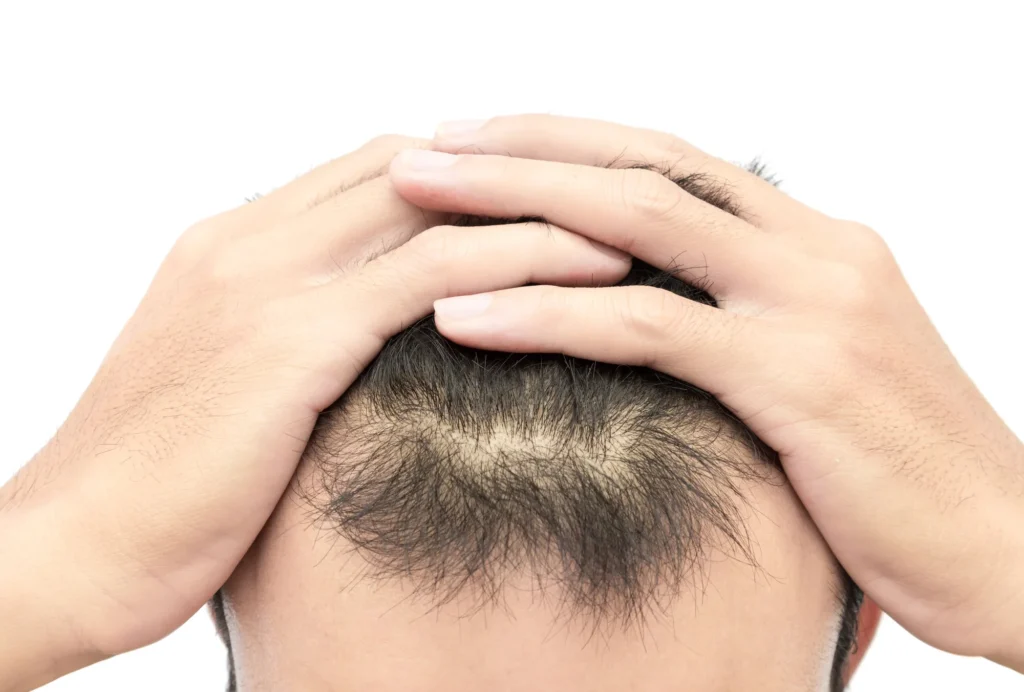Worried about a thinning hairline and looking for real solutions? How to Stop Receding Hairline offers expert-backed strategies to slow hair loss, stimulate regrowth, and protect your existing hair.
This guide covers proven treatments, lifestyle changes, and medical options tailored to your needs.

By understanding the causes and acting early, you can take control of your hair health. Trusted by specialists and grounded in science, this resource helps you make informed choices for lasting results.
Start your journey to a fuller hairline today.
Learn more from: Exercise for Blood Circulation in Scalp: Natural Support for Hair Health
What Is a Receding Hairline?
A receding hairline typically starts with gradual thinning at the temples, often progressing to form an “M” shape. This is one of the earliest signs of male or female pattern baldness (androgenetic alopecia).
Common causes include:
- Genetics and family history
- Hormonal fluctuations (e.g., DHT sensitivity)
- Stress and poor scalp health
- Poor diet and nutrient deficiencies
- Harsh hair treatments or styling
How to Stop a Receding Hairline: Medical and Clinical Options
1. Follicular Unit Extraction (FUE) in Islamabad
FUE is a minimally invasive procedure that involves extracting individual follicular units from a donor area and implanting them in thinning regions.
Benefits of FUE:
- No linear scar
- Faster healing
- Natural-looking results
- Suitable for advanced hairline recession
Procedure Overview:
- Hair is trimmed to identify viable grafts
- Local anesthesia is administered
- Grafts are extracted and implanted precisely
- Recovery time: 5–7 days
- Full results visible in 9–12 months
Note: Results vary; ethical practices avoid overpromising.
2. Platelet-Rich Plasma (PRP) Therapy
PRP hair treatment uses your body’s own growth factors to stimulate dormant follicles and support hair regrowth.
PRP Benefits:
- Non-surgical and safe
- Enhances hair thickness
- Often used alongside FUE or medications
- Minimal downtime
Sessions are typically spaced 4–6 weeks apart, with maintenance every 4–6 months.

3. Medical Treatments for Hairline Stabilization
Under Dr. Rana Irfan’s supervision, patients may be prescribed evidence-based treatments like:
- Minoxidil (topical): Promotes hair growth and delays further loss
- Finasteride (oral): Reduces DHT levels in eligible male patients
- Hair-supportive supplements: Target nutritional deficiencies
Treatment plans are personalized after a consultation and scalp analysis.
4. Lifestyle and Scalp Health Strategies
In some early cases, supporting hair and scalp health can slow progression:
- Use gentle, sulfate-free shampoos
- Avoid tight hairstyles or harsh treatments
- Manage stress through exercise and rest
- Follow a protein- and iron-rich diet
Who Can Benefit from These Treatments?
You may be a candidate for clinical intervention if:
- Your hairline is actively receding
- You’ve noticed thinning over the temples or forehead
- You are in good general health
- You’re seeking a long-term, realistic solution
Hair Restoration in Islamabad with Dr. Rana Irfan
Dr. Rana Irfan is an ABHRS– and ISHRS-certified hair restoration surgeon with extensive experience in FUE and non-surgical treatments. His clinic in Islamabad offers:
- Advanced diagnostic tools (e.g., Trichoscopy)
- Ethical consultation practices
- Customized hairline restoration plans
- International patient coordination for medical tourism

Whether you’re a local resident or visiting from abroad, you can expect professional, patient-centered care in line with global standards.
General Pricing Overview
Costs for hairline restoration vary depending on the chosen treatment and individual case:
| Treatment | Approximate Starting Cost in Islamabad |
|---|---|
| FUE Hair Transplant | PKR 70,000–200,000+ (depending on grafts) |
| PRP Therapy | PKR 10,000–15,000 per session |
| Consultation & Medication Plan | PKR 3,000–6,000 |
For a customized estimate, a detailed in-person or virtual consultation is recommended.
Related Services
Frequently Asked Questions (FAQs)
Can a receding hairline grow back?
In some early-stage cases, yes. Topical treatments like minoxidil and PRP therapy can stimulate regrowth. However, advanced cases may require a hair transplant for restoration.
What is the most effective treatment for a receding hairline?
This depends on the cause and extent of the hair loss. FUE hair transplant offers long-term restoration, while PRP and medications can help stabilize early-stage hairline thinning.
Is hairline transplant safe?
Yes—when performed by an experienced, certified surgeon like Dr. Rana Irfan (ABHRS, ISHRS), FUE procedures are considered safe and effective with minimal downtime.
How much does a hairline restoration cost in Pakistan?
Hair transplant costs in Islamabad start from around PKR 70,000. The total cost varies depending on the number of grafts and complexity of the case.
Who is not a candidate for hairline restoration?
Individuals with active scalp infections, certain autoimmune conditions, or insufficient donor hair may not qualify for hair transplant. A consultation helps determine eligibility.
